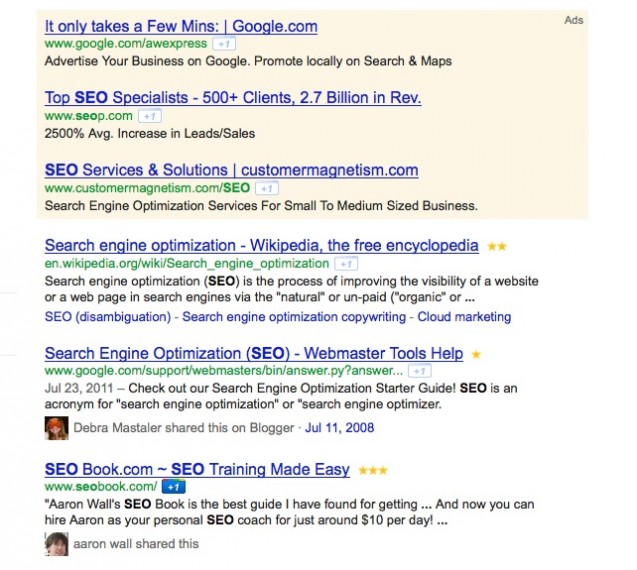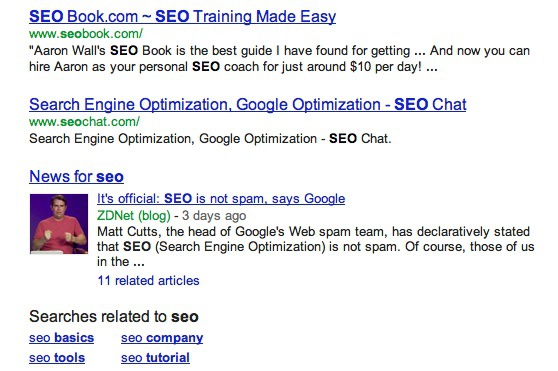Better rankings? More traffic? More conversions? Stability? What exactly do you hope to achieve by building links? Without a clear objective, it’s impossible to accurately measure your progress.
Much of the time, I’m asked to predict about how many links it will take to get to spot x in the SERPs. Oddly, I am rarely asked to define a number of links that will bring more traffic or more conversions, even though people do expect that higher rankings will lead to higher traffic and sales. I don’t think that’s always true of course, as it ignores many on-site issues. However, considering I am not always privy to analytics-based information, I don’t usually have that much to work with. I can say this though: defining your goal helps me define my strategy when I’m flying blind. I’ll start with the most common goals in the order of importance, from my own personal perspective.
Improved Rankings
Let’s say that you want better rankings. (Doesn’t everyone?) You first need to define what spot will make you happy for your targeted keywords. Moving someone from page 4 to page 2 is pretty simple usually, but moving someone from number 3 to number 2 takes a lot of effort if the niche is quite competitive. If you’re going to buy your way to the top, prepare to spend more for moving up spots once you’re on the first page unless your keyword of choice is a massively uncompetitive longtail.
Getting consistent ranking results is extremely difficult due to personalized search of course, and this throws off this metric so completely that it’s not one I can ever recommend that you rely upon. What I see as number three might be number four for you, and just because you’re logged in to Google and see your site ranking number one, that doesn’t mean that it IS number one.
Examples:
 SEOBook.com ranking at number 3 when I'm logged into Google
SEOBook.com ranking at number 3 when I'm logged into Google
 SEOBook.com ranking at number 9 when I am not logged into Google
SEOBook.com ranking at number 9 when I am not logged into GoogleWhen it comes to accurately measuring rankings, if that is indeed your concern, I think you’re going to find that using a general trend of spots is better than insisting upon number 5 and freaking out when you’re showing up as number 6 one day. If you’ve been in the top 3 for a year and you suddenly fall to page 5, that should definitely concern you of course, but if you’re seeing a bit of fluctuation, that isn’t usually a sign that things are about to collapse.
(By the way in case you’re interested, Bruce Clay published a formula for calculating the value of organic rankings. http://www.bruceclay.com/newsletter/volume96/seo-ctr-formula.htm)
Increased Traffic
This should theoretically improve with an improvement in rankings but that isn’t always what happens. You need to first make sure that your SERP listing does encourage people to click on it so that you’ll get results from a rankings increase, of course.
Off page though, if you’re actively seeking links in order to build traffic (and by this I mean that you’re asking for links whether they’re paid or not) you need to carefully evaluate the potential site’s metrics in order to determine whether it will help you or not. A link placed on a high-traffic page that gets good social love and ranks well for certain relevant keywords could be an amazing source of traffic for you. A link placed on a giant link list on a site that gets lots of traffic but is totally irrelevant to your niche probably isn’t something that you want to pursue though. If someone’s giving you a link, then hey, you’re lucky and don’t complain about, but if you’re going to invest resources and cash into a link, I’d make sure that it’s going to actually benefit you in some way. Relevancy is quite important here as is link placement. If you’re getting a link at the end of a list of 500 resources, you may not see much traffic from it even if the niche is extremely relevant. A link placed on a new blog post that is getting tons of attention socially send tons of relevant traffic though.
(Traffic is pretty easy to measure if you’re using any sort of analytics package and it’s quite easy to measure traffic generated by the links in question. In a perfect world if you’re building links, you should be seeing traffic increases across the board that you won’t be able to track back to an exact link at all times, too. Just keep an eye on it, no matter how exactly you decide to do so.)
Increased Conversions
Just like with traffic considerations, relevancy is critical if your goal is increased conversions, no matter what sort they are. You can get better rankings and more traffic but conversion improvement won’t occur automatically if your traffic isn’t relevant. While conversion isn’t always something that link builders think about (due to that old adage of us getting the horse to water and you making him drink) but careful thought beforehand can definitely help ensure that conversions are indeed more likely. Nothing we can do can make someone convert once they’re on your site, though, so some internal digging around to figure out what’s going on is usually a good idea if conversions aren’t happening as you’d expect.
…And Then Keep It Up!
See what everyone else is doing and keep doing what you’ve been doing. You can’t just build links for a bit, get that coveted spot in the SERPs, and quit, or someone else will come along and snap up your spot. Unfortunately things happen. Budgets get slashed, clients come and go, employees quit. However, you can’t really rest on your laurels in the online marketing world so here are a few ideas to help you prevent this kind of stagnation:
- Don’t rely solely on paid links. When the link terms and the money run out, you’re screwed. In that same vein, don’t rely on any one method of building links, period. Mix it up.
- Don’t rely on just one person to build links for you without knowing exactly how it’s being done.
- Think of ideas that will continue to generate links after that initial push like great content that continues to amuse/entertain/educate, guest post series, widgets, and linkbait of any form possible.
- Don’t underestimate the power of using social media to continue to keep your name out there when link building slows. Just don’t use it as your only backup.
- Keep an eye on your existing link profile. If a great link that sent you lots of relevant traffic is suddenly removed, contact the webmaster and ask about it. Keep an eye on your competitors’ link profiles too, if you can, and make use of the broken link building method. (http://citationlabs.com/36-broken-link-building-resources/)




